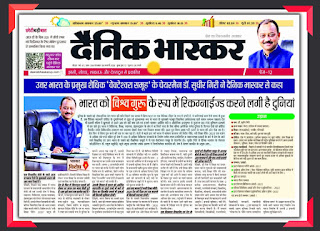SIGNIFICANCE OF PRIMARY EDUCATION IN THE DEVELOPMENT OF A CHILD’S FUTURE
“For a system to flourish, its foundation must be strong ”~Dr. Sudhir Giri.
India is an emerging superpower and
the biggest credit for that goes to the strong industrial and economic growth
in recent times.
But, is economic development
possible without proper education? The answer is definitely “no”.
Without an excellent education
system, the progress of a nation is next to impossible.
If we talk about education, most of
the leaders and pioneers in the country suggest the government must make
reforms and introduce policies in the higher education sector.
Dr. Sudhir Giri, the honorable
chancellor of Venkateshwara Group of Institutions, manages many other
educational institutes, universities, medical colleges, and schools, has a
different take on this.
Even though Dr. Giri promotes and
focuses on higher education and research, he also believes that a system can
only flourish when its foundation is strong.
Primary education is the very base
of a child’s future.
It is the fundamental right of every
kid, irrespective of their background or social status of their family.
As a step towards the progression
and betterment of primary and secondary education in India, Dr. Giri has
successfully established the “Venkateshwara World School”.
Many branches of this school are
working towards the advancement of primary education. These schools also impart
education to children with special needs. They work with the aim and commitment
to providing a pleasant and inspiring learning experience to underprivileged
children, & facilitate to realize their full potential.
The Schools emphasize academic
excellence and the overall development of children by offering a combination of
curricular and extra-curricular elements.
We established these schools with a
mission to provide a learning experience that makes every child happy and a
whole person. It is a place where children learn new skills that are important
for building confidence and facing challenges, exploring infinite
possibilities, and shining as complete individuals.
Through good primary education,
children’s social, intellectual, enthusiastic, and actual abilities can be
fostered.
Primary education is one of the most
essential rights of every kid. The significant aim of primary education is to
bring mindfulness among kids, open roads of chances alongside self-development,
and diminish generational poverty.
Primary education, without a doubt,
is essential for development in the initial stages of child growth. To match
paces with the competitive world, we prepare minors from the beginning of their
lives.
From the tender age of four or five
years, the kids learn how to connect with fellow members at school and home.
They learn values like sharing,
teamwork, cooperation, dependability, creativity, and communication. The role
of primary education is to assure that the kids are developing.
We know Dr. Sudhir for his noble and
philanthropic pursuits, be it in the domain of education or healthcare.
The primary school “Venkateshwara
World School” set up under the leadership of Dr. Sudhir Giri imparts education
to hundreds of children, not just from the higher society but also from the
weaker sectors and also to children with special needs.
Sir’s mission of “affordable
education for all” is not merely limited to higher education. He has been
working from the grassroot level, ensuring that children have a secure and
productive future. There are many challenges that the education system has to
overcome in a developing nation like India.
As per stats, there are
approximately 14, 94,052 Primary schools in India, this includes private and
government schools.
An article stated India has 3 times
more primary schools than China, however, despite such promising stats, the
literacy rate of India is not high.
The major reason behind it is the
lack of education in the grown-up populace. A major factor is a lack of quality
education being provided at these schools. The 2011 ASER stated that only 48.2%
of children studying in the fifth grade can read at the second-grade level.
The number of students completing
their primary education with inadequate literacy skills is shocking. Further,
the biggest hurdle in primary education is an insufficient and incompetent
teaching force.
If we talk numbers, then the teacher
ratio in Indian primary schools is declining at a startling rate.
As per the Ministry of Education,
the pupil-teacher ratio in primary schools was at 43 in 2010-11 and has come
down to 26.3 in 2020- 21.
There are only a handful of schools
with the requisite number of teachers with adequate qualifications and
motivation to impart knowledge.
In a majority of schools, the
teaching methodologies are not up to the mark, there is a lack of motivation
and absenteeism, linguistic diversity, etc.
With these issues in mind, Dr. Giri
entered the field of Teacher’s Training (B.Ed), to address the shortage of
qualified teachers for the advancement of primary education. He then started
expanding his domains by opening many other education institutions.




Comments
Post a Comment